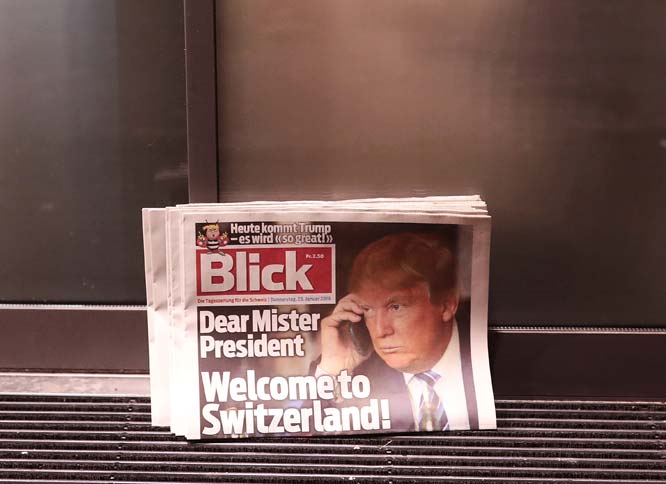 Bloomberg photo by Simon Dawson
Bloomberg photo by Simon Dawson
"It's hard to imagine an audience less receptive to Mr. Trump's 'America First' agenda," remarked The New York Times, which months ago established itself as the president's most faithful nemesis. "Yet, whether he is seeking reconciliation or pitching for strongman status, his mere presence is a rebuke to the elites who got him badly wrong."
The theme of this year's sessions of the World Economic Forum, as the glitterati call Davos, is "Creating a shared future in a fractured world," and the glitterati just can't get their heads around the fact that resigning themselves to a fractured future just isn't what Americans do.
Trying to fix the future is more interesting. George Soros, the billionaire Hungarian with a trillion-dollar inferiority complex and a particular aversion to America and Donald Trump, got to Davos first and laid out a welcome intended to provoke a presidential Twitter storm.
He threw a dinner to give himself a platform to go sliming. Like the gathered elites, Mr. Soros sees the president as an evil, great and powerful. Mr. Soros imagines that only someone as big and great as he is can cut the president and America down to the size he thinks they ought to be.
"I consider the Trump administration as a danger to the world," he told his dinner guests. "But I regard it as a purely temporary phenomenon that will disappear in 2020, or even sooner." At age 87, he is a temporary phenomenon, too, and maybe more so. Some of us are more temporary than others, and may disappear in 2020, too, "or even sooner."
He expects a Democratic landslide this year, just as he expected a Hillary landslide in 2016. Mr. Soros is entitled to his opinion, as we all are, but he has not yet learned that great wealth is a convenience, but does not confer anything but smarts and luck in making a lot more money.
Other rich guys have learned this expensive lesson before him. Henry Ford thought he was a political sage, too, and even chartered a ship to take his smarts to Europe to spread his sagacity in the wake of World War I. As time and events would demonstrate, he knew more about carburetors and crankshafts than about how to arrange world peace.
Rich guys can get applause for stating mere platitudes. "Mankind's ability to harness the forces of nature, both for constructive and destructive purposes, continues to grow," he said, blowing solemn and wise, "while our ability to govern ourselves properly fluctuates, and is now at a low ebb. The survival of our entire civilization is at stake." And blah, blah, blah, and more clap, clap, clap.
North Korea frightens him (as it does the rest of us) and naturally it's Donald Trump's fault. The United States must accept North Korea as a nuclear power, he says, and then co-operate and negotiate with the peaceable Chinese to establish an alliance that's better able to confront Pyongyang. "North Korea first," Rocket Man might put it.
The fact of a nuclear war is so horrendous that the rest of the world is trying to ignore it, "but it is real," and it's the United States that is set "on a course toward nuclear war by refusing to accept that North Korea has become a nuclear power.
"This creates a strong incentive for North Korea to develop its nuclear capacity with all possible speed, which in turn may induce the United States to use its nuclear superiority pre-emptively, in effect to start a nuclear war to prevent a nuclear war, obviously a self-contradictory strategy." You might think a man as rich as Mr. Soros could afford to hire better writers than this.
Barack Obama is widely credited with putting Donald Trump on the path to the White House with demeaning remarks about him at a dinner of the White House Correspondents Association, and if that's so perhaps his critics should blame the World Economic Forum at Davos for snubbing Mr. Trump until now. He set out this year to show the elites that his ego is bigger than theirs. Why else would anybody go so far to endure such tedium?
The president took an erudite team with him to Davos, to make sure he has adequate help. But he should do all right. He could retrieve that old bumpersticker with a message for the elites and their holy rituals of gasbaggery at Davos: "I may be slow, but I'm ahead of you."
Comment by clicking here.
JWR contributor Wesley Pruden is editor emeritus of The Washington Times.


 Contact The Editor
Contact The Editor
 Articles By This Author
Articles By This Author